|
|
|
Sort Order |
|
|
|
Items / Page
|
|
|
|
|
|
|
| Srl | Item |
| 1 |
ID:
081451
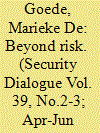

|
|
|
|
|
| Publication |
2008.
|
| Summary/Abstract |
In the context of the `war on terror', techniques of imagining the future have taken on new political significance. Richard Grusin has coined the term `premediation' to describe the way in which news media and cultural industries map and visualize a plurality of possible futures. This article examines the relation between the politics of risk and premediation as a security practice. Premediation simultaneously deploys and exceeds the language of risk. Its self-conscious deployment of imagination in security practice feeds economies of both anxiety and desire
|
|
|
|
|
|
|
|
|
|
|
|
|
|
|
|
| 2 |
ID:
081459
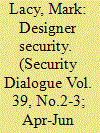

|
|
|
|
|
| Publication |
2008.
|
| Summary/Abstract |
This article suggests that Gilles Deleuze's writings on societies of control provide useful insights on changing configurations of biopower in contemporary societies. However, far from the dystopias depicted in many popular visions of the future, such as the films THX 1138 and Minority Report, societies of control are being shaped by the work of designers, creating the potential for an `ecology of control' that can become `benignly' woven into our lives. MoMA's exhibition SAFE: Design Takes On Risk is a fascinating introduction to designers' responses to risk and insecurity around the planet, along with work that interrogates critically our obsessions with risk, control, and insecurity. SAFE illustrates an emerging synergy between designers and policymakers that makes possible the intensification of control society through products of `communectivity' (such as the ironic `Homeland Security Blanket') and designer security. Indeed, `designing in' protection and `designing out' insecurity are mantras that are increasingly important to contemporary discourses of security in risk-obsessed states. The article expresses the author's concern that discourses of design and security suppress anxiety about the ethico-political consequences of control society, along with broader issues of security politics, at the same time as they install new policy initiatives and `synergies' through the desire to design out insecurity
|
|
|
|
|
|
|
|
|
|
|
|
|
|
|
|
| 3 |
ID:
081457
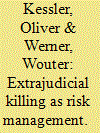

|
|
|
|
|
| Publication |
2008.
|
| Summary/Abstract |
This article analyses legal aspects of the `war on terror'. It argues that, by making recourse to a semantic of risk, danger and, in particular, precaution, the `war on terror' blurs crucial political and legal categories of public and private, of peace and war, of combatants and civilians, thus redefining the relationship between political responsibility, time and security. As a consequence, the extrajudicial killing of individuals becomes a form of risk management that takes place beyond established mechanisms of accountability.
|
|
|
|
|
|
|
|
|
|
|
|
|
|
|
|
| 4 |
ID:
081456


|
|
|
|
|
| Publication |
2008.
|
| Summary/Abstract |
Increasingly, governmental responses to incalculable, but high-consequence, threats to life and security are framed by what has been described as the `precautionary principle' (Ewald), `preparedness' (Collier, Lakoff & Rabinow) or `pre-emption' (Derrida). This article redescribes features common to these characterizations as the paradigm of prudence and examines how this approach to risk management is playing out in the context of fears that feature within the Australian political imaginary. We explore how the approach to the future entailed in the paradigm enframes `life' and stifles democratic participation and innovation in ways of living. Three case studies (in biosecurity, bioecology and biomedicine) demonstrate not only how the paradigm pervades the government of everyday life, but also how it is challenged by human `agents', material `life' and the dynamic relations between these two. By formulating what this involves, we point to a concept of the political more conducive to democratic pluralism, diversity of life and innovative culture
|
|
|
|
|
|
|
|
|
|
|
|
|
|
|
|
| 5 |
ID:
081455
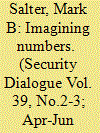

|
|
|
|
|
| Publication |
2008.
|
| Summary/Abstract |
Aviation security is a vital but under-studied component of contemporary security. This article uses the Foucauldian notion of a `dispositif of security' to understand how policies, practices, and institutions of aviation security are arranged to surveil, police, and control mobile populations. Moving beyond sovereign accounts of law or disciplinary descriptions of incarceration, the analysis of the dispositif demonstrates the ever-expanding areas of life that are colonized by `security' and `risk'. I argue that the general strategy of quantification and the specific tactic of the expert panel both illustrate how the invocation of risk allows for new and expanding security practices, and also masks the depoliticization of the airport and civil aviation
|
|
|
|
|
|
|
|
|
|
|
|
|
|
|
|
| 6 |
ID:
081452
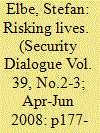

|
|
|
|
|
| Publication |
2008.
|
| Summary/Abstract |
This article analyses the conjunctures of risk and security that have recently emerged in the securitization of HIV/AIDS. Although these partially corroborate Ulrich Beck's notion of risk society, important elements of the securitization of HIV/AIDS resist his understanding of risk as a `danger of modernization'. The article therefore turns to François Ewald's alternative theorization of risk as a `neologism of insurance', and shows that insurance is a risk-based security practice widely used to manage the welfare of populations. Such a biopolitical approach to risk is also valuable for analysing the securitization of HIV/AIDS, which, even though it is unfolding outside the domain of insurance, similarly draws upon multiple risk categories (`security risks', `risk groups' and `risk factors') in efforts to improve the collective health of populations. Analysed through a wider concept of risk as a `biopolitical rationality', the conjuncture of risk and security in the securitization of HIV/AIDS thus emerges as a principal site where the institutions of sovereign power in international relations are being absorbed and integrated within a wider biopolitical economy of power.
|
|
|
|
|
|
|
|
|
|
|
|
|
|
|
|
| 7 |
ID:
081453
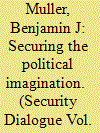

|
|
|
|
|
| Publication |
2008.
|
| Summary/Abstract |
What is the relationship between popular culture and the reliance on risk management as a framework for governance in the emerging security dispositif? Furthermore, how is one to understand the influence of culture and cultural forces in relation to the emerging biometric state and the alleged security imperatives therein? This article contends that the emerging security dispositif, and the associated imaginations and cultural performances that sustain and shape it, are vital to the production of what is referred to here as the `biometric state'. Motivated by an obsession with technologies of risk and practices of risk management, the biometric state is defined by the prevalence of virtual borders and reliance on biometric identifiers such as passports, trusted-traveller programmes and national ID cards, as well as the forms of social sorting that accompany these manoeuvres. Raising the marriage of convenience that connects two related dispositifs of security - geopolitics and biopolitics - the article considers the relationship between their referent objects: the state and everyday life, respectively. More specifically, popular culture integral to sustaining the emerging security dispositif forms the core of the analysis, as the article asserts the constitutive possibilities of popular culture
|
|
|
|
|
|
|
|
|
|
|
|
|
|
|
|
| 8 |
ID:
081454


|
|
|
|
|
| Publication |
2008.
|
| Summary/Abstract |
In this article, we explore the ways in which cross-disciplinary theories of risk can enable us to grasp salient issues that arise out of the construction, assessment and regulation of terrorism in contemporary society. First, we demonstrate how risk society theory can be utilized to unpack the changing nature of terrorism. Second, deploying Furedi's work on the culture of fear, we show how the discourse of terrorism nestles into a broader politics of risk that is disproportionately directing economic and political policies and encouraging a climate of public anxiety. Third, utilizing the tools of the governmentality perspective, the linkages between measures designed to combat the terrorist threat and authoritarian domestic law and order policies are elucidated. We go on to analyse the contents and practices of the `war on terror', arguing that the offensive and pre-emptive strategies that it legitimates are wedded to a creeping shift in risk assessment from retrospective estimations of harm to an outlook based on futurity. It is posited that this shift ushers in a number of contradictions and dilemmas around the political deployment of discourses of risk.
|
|
|
|
|
|
|
|
|
|
|
|
|
|
|
|
| 9 |
ID:
081458
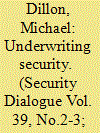

|
|
|
|
|
| Publication |
2008.
|
| Summary/Abstract |
This article enframes `risk' as a biopolitical security technology. It explains how biopolitics of security take life as their referent object of security; how the grid of intelligibility for biopolitics is economic; and how, in the second half of the 20th century, life also came to be understood as emergent being. Contingency is constitutive especially of the life of emergent being, and so the article argues that a biopolitics of security that seeks `to make life live' cannot secure life against contingency but must secure life through governmental technologies of contingency. Risk is one of these technologies. The article also explains how risk has come to pervade the biopolitics of security of the 21st century, and how, through the way in which it is traded on the capital markets, it has begun to acquire the properties of money. The article closes by describing how the biopolitics of security differ from traditional prophylactic accounts of security, and how these biopolitics of security exceed the liberal political thinking that rationalizes and legitimates them
|
|
|
|
|
|
|
|
|
|
|
|
|
|
|
|
|
|
|
|
|